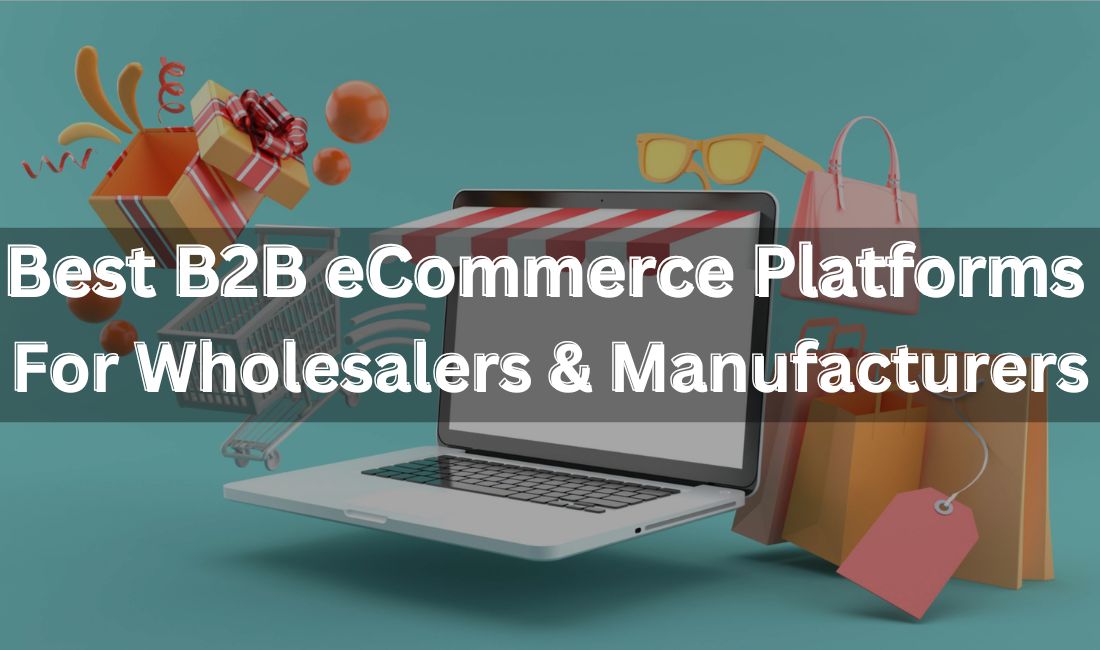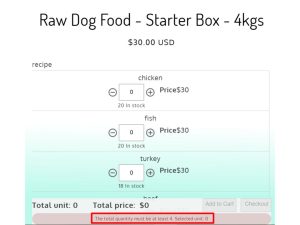
By 2025, analysts from Gartner anticipate 80% of B2B sales interactions to occur via digital channels. Imagine this: You’ve worked hard to build a strong network of wholesale buyers, but your online store isn’t equipped to handle bulk orders, customer-specific pricing, or complex invoicing. Frustrated buyers leave, and you miss out on huge revenue opportunities.
So, how do you pick the best B2B eCommerce platform to power your business? This guide breaks down 17 top B2B platforms, their pros and cons, and which one suits your business needs.
Table of Contents
Let’s dive in!
The Ultimate List of the 17 Best B2B Platforms With Pros and Cons
- Shopify Plus
- Virto Commerce
- Salesforce
- BigCommerce
- WizCommerce
- Pepperi
- nopCommerce
- WooCommerce
- Znode
- Spryker
- Adobe Commerce
- Oracle Commerce
- SAP Commerce Cloud
- Pulse Commerce
- NuOrder
- PrestaShop
- CS-Cart
Platform#1 Shopify Plus: Best for Growing B2B & DTC Hybrid Businesses
If you sell directly to consumers (DTC) and want an easy-to-use, scalable solution with strong automation capabilities, then this one is for you. It offers bulk pricing, automated discounts, and custom storefronts—perfect for scaling businesses. Shopify app store has many third-party bulk order apps to make the journey smoother.

Pros:
✅ Built-in B2B features (customer-specific pricing, bulk orders)
✅ Multi-store management for global sales
✅ Seamless integration with bulk order apps
Cons:
❌ Higher cost than standard Shopify plans
❌ Customization may require developer support
Platform#2 Virto Commerce: Best for Modular, API-Driven Solution
Virto Commerce is all about flexibility. It’s an open-source B2B platform that lets you customize everything, from pricing rules to integrations. It is great for large B2B businesses that need a flexible, headless commerce solution with strong API capabilities.
Pros:
✅ Highly customizable with modular architecture
✅ Scalable for large enterprises
✅ Strong API integrations
Cons:
❌ Requires technical expertise
❌ High cost for smaller businesses
Platform#3 Salesforce: Best for Advanced Automation
Built for big businesses, Salesforce Commerce Cloud helps you sell across multiple channels while keeping customer data in one place. It is best for large B2B businesses that need advanced automation, personalized customer experiences, and seamless integration with CRM and marketing tools. If your business deals with complex pricing, multi-channel sales, and high-volume transactions, this platform is a great fit.
Pros:
✅ Native integration with Salesforce products
✅ AI-driven insights
✅ Supports complex pricing and quoting
Cons:
❌ Expensive for small businesses
❌ Requires training for full utilization
Platform#4 BigCommerce: Best for Mid-to-Large B2B Sellers
BigCommerce makes selling wholesale easy with built-in B2B features like customer-specific pricing and bulk order discounts. It’s great for merchants who want flexibility without heavy customization.
Pros:
✅ No transaction fees
✅ Built-in B2B features like corporate accounts & custom pricing
✅ Easy API integrations
Cons:
❌ Limited themes compared to Shopify
❌ Add-ons required for some features
Platform#5 WizCommerce: Best for Fast-Growing B2B Startups
WizCommerce simplifies complex B2B sales with smart automation tools. It’s a great choice for businesses that need quick quotes, fast order processing, and seamless customer management. It’s also an awesome solution for startups looking for an AI-powered B2B eCommerce platform with automation features.
Pros:
✅ AI-driven product recommendations
✅ Automated sales workflows
✅ Scalable for growing businesses
Cons:
❌ Less known in the market
❌ Requires integration with third-party systems
Platform#6 Pepperi: Best for Field Sales and Mobile Orders
If you run a wholesale business, Pepperi is worth a look. It specializes in mobile-first B2B eCommerce, helping sales reps and customers place bulk orders easily from anywhere.
Pros:
✅ Mobile-friendly with offline support
✅ CRM and ERP integration
✅ Ideal for wholesalers and manufacturers
Cons:
❌ Limited customization compared to open-source platforms
❌ Requires subscription fees
Platform#7 nopCommerce: Best for .NET-Based Businesses
nopCommerce is a free, open-source platform with strong B2B features like multi-vendor support and flexible pricing. It’s perfect for businesses that want full control over their store.
Pros:
✅ Free and open-source
✅ Scalable for large businesses
✅ Strong customization options
Cons:
❌ Requires .NET expertise
❌ Limited built-in B2B features
Platform#8 WooCommerce: Best for Open-Source Flexibility
WooCommerce is great for small-to-mid-sized B2B businesses that prefer open-source flexibility and already use WordPress. With the right plugins, you can add bulk pricing, customer groups, and wholesale order forms to your store.
Pros:
✅ Open-source and fully customizable
✅ No monthly platform fees
✅ Flexible pricing structures for wholesale
Cons:
❌ Requires WordPress knowledge
❌ Extensions needed for advanced B2B features
Platform#9 Znode: Best for Multi-Store and Multi-Tenant B2B Businesses
Znode is designed for businesses with multiple stores, warehouses, or customer groups. It lets you manage everything in one place, making complex B2B sales much easier.
Pros:
✅ Supports multi-store management
✅ Flexible pricing structures for different customer groups
✅ API-first approach
Cons:
❌ Steeper learning curve
❌ Requires IT support for customization
Platform#10 Spryker: Best for Highly Customizable B2B Solutions
Spryker is built for fast-growing B2B businesses that need a flexible, API-driven B2B eCommerce solution. It’s modular, so you can pick and choose the features that work best for your business.
Pros:
✅ Headless commerce for ultimate customization
✅ Multi-store, multi-language support
✅ Strong API integrations
Cons:
❌ High cost
❌ Requires a development team
Platform#11 Adobe Commerce: Best for Large Enterprises
Adobe Commerce, formerly Magento, is known for its deep customization. It’s a powerful B2B platform, perfect for businesses that need advanced pricing, catalogs, and integration options.
Pros:
✅ Highly flexible and feature-rich
✅ Supports complex B2B workflows like contract pricing
✅ Multi-store and multi-warehouse management
Cons:
❌ High development costs
❌ Requires technical expertise
Platform#12 Oracle Commerce: Best for Global Operations
Big enterprises trust Oracle Commerce for its advanced AI-driven personalization and B2B ordering features. It’s great for large companies with complex product catalogs.
Pros:
✅ AI-driven personalization
✅ Built-in analytics and data insights
✅ Supports multi-language and multi-currency transactions
Cons:
❌ High implementation costs
❌ Requires IT expertise for setup and maintenance
Platform#13 SAP Commerce Cloud: Best for ERP Solutions
SAP Commerce Cloud is ideal for businesses that need a strong backend system for managing large B2B transactions. It integrates smoothly with SAP’s ERP solutions.
Pros:
✅ Strong ERP and supply chain integration
✅ Scalable for global enterprises
✅ AI-driven personalization features
Cons:
❌ High cost
❌ Requires technical expertise
Platform#14 Pulse Commerce: Best for Advanced Order Management
Pulse Commerce is a B2B platform with real-time inventory tracking and order management. It’s a great fit for merchants who need precise stock control and fast order processing.
Pros:
✅ Real-time inventory and order tracking
✅ Multi-channel support (B2B & B2C)
✅ Strong analytics tools
Cons:
❌ Limited themes and design options
❌ Requires additional integrations for full functionality
Platform#15 NuOrder: Best for Digital Wholesale Platform
NuOrder is a B2B eCommerce platform built for fashion, retail, and lifestyle brands. It offers interactive catalogs and digital showrooms to make wholesale buying easier.
Pros:
✅ Great for wholesale businesses
✅ Digital catalogs and order automation
✅ Strong analytics and reporting tools
Cons:
❌ Limited as a full eCommerce platform
❌ Not ideal for hybrid B2B & B2C businesses
Platform#16 PrestaShop: Best for Budget-Conscious Businesses
PrestaShop is a budget-friendly option with strong B2B features like customer segmentation and tiered pricing. It’s a good choice for small-to-medium businesses looking for flexibility.
Pros:
✅ Free open-source platform
✅ Great for international selling
✅ Supports multi-variant pricing
Cons:
❌ Steep learning curve
❌ Add-ons can increase costs
Platform#17 CS-Cart: Best for Businesses Managing Vendors
CS-Cart is perfect for merchants who want both B2B and B2C sales in one place. It offers built-in multi-vendor features, making it a great choice for online marketplaces.
Pros:
✅ Supports vendor management
✅ Multi-store functionality
✅ Customizable API
Cons:
❌ Requires a learning curve
❌ Higher setup cost
Key Business Factors to Consider Before Choosing a B2B Platform
The right B2B eCommerce platform should align with your business model, growth plans, and operational needs.
What Are You Selling? Your product type influences your platform choice. Are you selling physical goods, digital products, subscriptions, or custom-made items? If your business involves complex pricing, bulk orders, or custom quotes, you’ll need a platform that supports those features.
Who Are Your Customers? Are your B2B buyers wholesalers, retailers, distributors, manufacturers, or enterprise clients? Understanding your audience helps determine whether you need features like multi-user accounts, volume-based discounts, or approval workflows for corporate buyers.
How Do You Handle Pricing & Payments? B2B pricing is often negotiated or customized based on buyer relationships. Do you offer tiered pricing, bulk discounts, or contract-based pricing? Also, think about payment preferences.
How Large & Scalable Is Your Business? Consider your current order volume and future growth plans. If you plan to scale globally, you may need multi-currency, multi-language, and tax compliance support.
What’s Your Budget? Consider both upfront costs (development, setup) and ongoing costs (maintenance, hosting, transaction fees). A more affordable solution might be ideal if you’re just starting. A high-investment platform could be better for long-term growth.
Must-Have Features in B2B eCommerce Solutions
Choosing the right B2B eCommerce platform can make or break your business. With so many options, how do you know which one is best? Let’s break it down.
- Scalability and Flexibility
- Headless Architecture
- Third-Party Integration
- Customization and Extensibility
- Cloud-Based Reliability
Feature#1 Scalability & Flexibility
Your business will grow—your platform should too! Look for modular systems that let you add features as you scale. This keeps your store agile and future-proof.
Feature#2 Headless Architecture
Want more control over your store’s design and performance? A headless platform separates the front and back end, giving you the flexibility to create a custom experience without backend limitations.
Feature#3 Third-Party Integrations
Your eCommerce platform should connect seamlessly with CRM, ERP, and payment gateways. The more integrations, the better your workflow!
Feature#4 Customization & Extensibility
No two B2B businesses are the same. Choose a platform that allows custom workflows and tailored pricing structures.
Feature#5 Cloud-Based Reliability
A cloud-native platform offers better security, uptime, and performance. It keeps your store running smoothly.
Conclusion
The right B2B platform depends on your business model, growth plans, and technical needs. No matter which platform you choose, ensuring it supports bulk ordering, flexible pricing, and customer segmentation is crucial to maximizing B2B sales.
B2B eCommerce Solutions FAQs
How do I Select The Right B2B eCommerce Platform For my Business?
Consider your budget, scalability, required integrations, and bulk order functionality. Choose a platform that aligns with your growth plans.
What Are The Benefits of Selling on a B2B Platform?
B2B platforms streamline order processing, automate bulk discounts, support multiple pricing levels, and enhance buyer experience.
Why Do I Need A B2B E-commerce Solution?
Traditional eCommerce platforms don’t cater to bulk buying, customer-specific pricing, or invoicing—a B2B solution simplifies these processes.
How To Choose A B2B E-commerce Platform?
Evaluate platforms based on bulk order capabilities, multi-tier pricing, integrations, and ease of use before making a decision.
